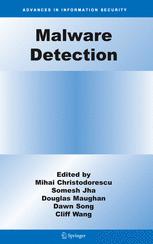

Most ebook files are in PDF format, so you can easily read them using various software such as Foxit Reader or directly on the Google Chrome browser.
Some ebook files are released by publishers in other formats such as .awz, .mobi, .epub, .fb2, etc. You may need to install specific software to read these formats on mobile/PC, such as Calibre.
Please read the tutorial at this link: https://ebookbell.com/faq
We offer FREE conversion to the popular formats you request; however, this may take some time. Therefore, right after payment, please email us, and we will try to provide the service as quickly as possible.
For some exceptional file formats or broken links (if any), please refrain from opening any disputes. Instead, email us first, and we will try to assist within a maximum of 6 hours.
EbookBell Team

4.0
96 reviewsMany malicious attacks are achieved by malicious code or malware, such as viruses and worms. Shared resources, such as the Internet, have created a highly interconnected cyber-infrastructure. Critical infrastructures in domains such as medical, power, telecommunications, and finance are highly dependent on information systems. These two factors have exposed our critical infrastructures to malicious attacks and accidental failures. Given the deleterious affects of malware on our cyber infrastructure, identifying malicious programs is an important goal. Unfortunately, malware detectors have not kept pace with the evasion techniques commonly used by hackers--the good guys are falling behind in the arms race.
Malware Detection, based on the Special ARO/DHS Workshop on Malware Detection at Rosslyn, VA, in 2005, captures the state of the art research in the area of malicious code detection, prevention and mitigation.
This edited volume is intended for researchers and developers working on malicious code (malware) detection, prevention and mitigation. In addition it can be used for a senior level undergraduate course, or for a graduate course in the area of computer and software security.